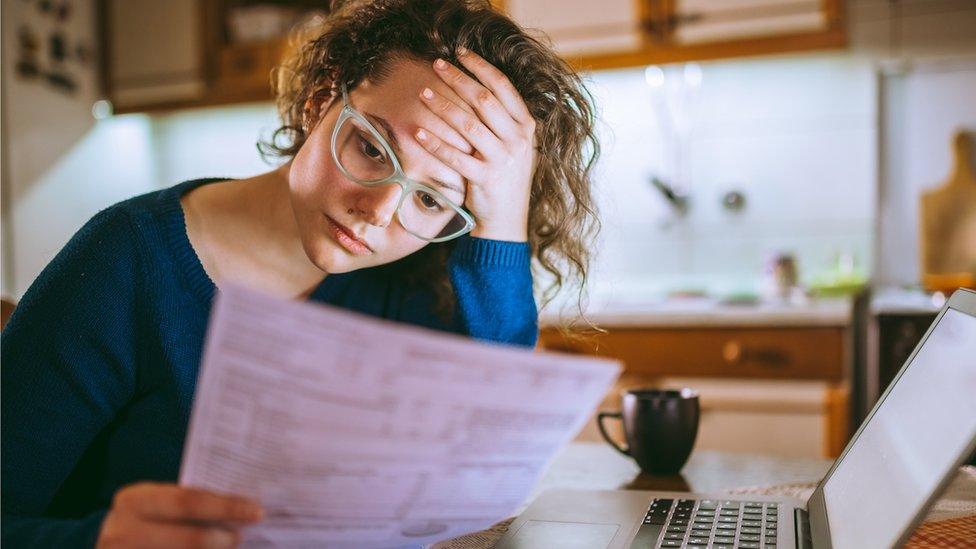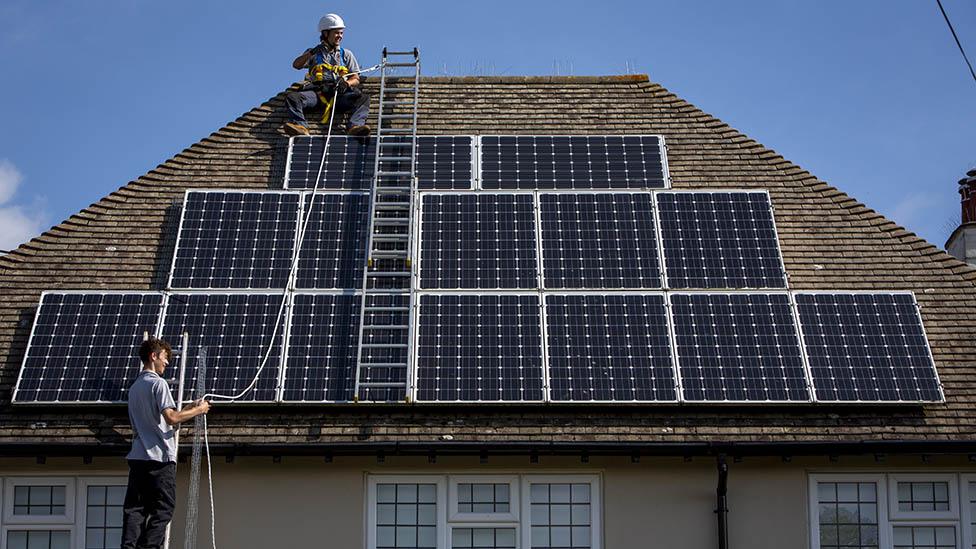Energy bills: Liz Truss 'plans to tackle rising charges with tax cuts'
- Published

Liz Truss would prioritise tax cuts over giving direct payments to every household to help cover the cost of rising energy bills, if she were to become prime minister, a source close to her has told the BBC.
Reports suggest Ms Truss is considering cutting VAT across the board by 5%.
But her Tory leadership rival Rishi Sunak said the government "must provide some direct support" to all.
All households are due to receive £400 off their energy bills this winter.
This was part of a package of help announced by Mr Sunak in May when he was still chancellor.
On Friday, energy regulator Ofgem hiked the price cap on household bills by 80%, meaning the typical household gas and electricity bill will rise to £3,549 a year from October.
Both candidates to succeed Boris Johnson have faced repeated questions about what action they would take.
Ms Truss has so far only confirmed she will cut National Insurance and green levies on bills.
On Sunday night, a member of Ms Truss's campaign team said: "Liz has been clear we need to lower the burden of taxation and focus on boosting energy supplies and this will be her priority as prime minister.
"She's also been clear further support may be required to help. Her preference is to target this to those most in need, but isn't ruling anything out."
Earlier on Sunday, a source close to her had said she had "ruled out" further direct support for everyone to pay energy bills.
It comes as newspaper reports suggest she is "mulling" cuts to VAT and increasing the amount of money people have to earn before they start paying income tax.
A report in the Sunday Telegraph, external suggests she is looking at a "nuclear" option to cut VAT by 5%, saying it could save the average household £1,300 a year.
Watch: Martin Lewis says people are staring into a "pit of financial doom" over energy costs
Mr Sunak's team has dismissed a cut to all VAT as being "incredibly regressive", saying it would cost more than £30bn.
A source on his campaign team added: "Tory members will not like the sound of Liz Truss boosting welfare - once it goes up, it's hard to take back down.
"It also means the worst off this winter are hardworking families and pensioners on middle incomes, which are Conservative and swing voters. Truss's plan is a gift to Labour."
The former chancellor has said he will cut VAT on energy bills and - writing in the Times on Saturday - said direct government support must be provided to everyone, with a focus on low-income households and pensioners.
He has also indicated that, for the most vulnerable household, he would try to make up the difference between the current energy price cap of £1,971 a year and the new cap of £3,549 by changing things like welfare benefits and pensioners' winter fuel credits.
Writing in the Mail on Sunday,, external Boris Johnson said his successor would deliver a "huge package" of support, without saying what that would be.
He said the months ahead were going to be "tough, perhaps very tough" and energy bills would be "eye-watering".
In his last week as prime minister, Mr Johnson is expected to give a speech about the future of energy that is likely to serve as a challenge to his successor not to neglect plans to ramp up other energy sources, like offshore wind and nuclear power.
Mr Sunak has already indicated his support for boosting insulation and offshore wind.
Ms Truss has voiced support for exploring more North Sea oil and gas and fracking, where communities support it. But she has criticised other forms of energy such as solar farms on agricultural land.
All households will get the £400 rebate on energy bills, with low income and vulnerable households receiving an additional £650.
Pensioners will also receive £300 along with their winter fuel payment in November, and people on an eligible disability benefit will receive an additional £150.
Worried about energy bills? The BBC's Colletta Smith tells you - in a minute - about four discounts and payments that could help
Labour and the Liberal Democrats have criticised the government's response to the growing cost-of-living crisis.
Labour has said its plan to freeze energy prices this winter - paid in part by a windfall tax on energy companies - would save someone on the minimum wage more than £40 a week.
Lib Dem leader Ed Davey said the energy price cap rise was "nothing short of a catastrophe for millions" and SNP Westminster leader Ian Blackford warned businesses could "go to the wall" over winter.

How much are energy prices rising by?
The price cap, set by Ofgem, is rising by 80% in October
The price of electricity will rise on average from 28p per kilowatt hour (kWh) to 52p and gas will go up from 7p to 15p per kWh
A typical annual energy bill paid by direct debit is currently £1,971. In October, that will rise to £3,549
Prepayment meter customers will pay an extra £59 a year from October, taking the new typical bill on a prepayment meter to £3,608

TRANSFER TRAGEDY: How did Emiliano Sala end up on that plane?
WATCHING PAINT DRY: Does more expensive paint actually offer a better finish?

- Published28 August 2022

- Published25 August 2022

